![Monkey: The Complete Series (Restored) [DVD]](/pictures/1153047.jpg) Monkey: The Complete Series (Restored) | DVD | (05/10/2020)
from £N/A
| Saving you £N/A (N/A%)
| RRP
Monkey: The Complete Series (Restored) | DVD | (05/10/2020)
from £N/A
| Saving you £N/A (N/A%)
| RRP In the worlds before Monkey, primal chaos reigned. Heaven sought order. But the phoenix can only when its feathers are grown. The four worlds formed again and yet again, As endless aeons wheeled and passed.Time and the pure essences of Heaven, the moisture of the Earth, the powers of the sun and the moon . All worked upon a certain rock, old as creation. And it became magically fertile. That first egg was named Thought . Tathagata Buddha, the Father Buddha, said, With our thoughts, we make the world. Elemental forces caused the egg to hatch.From it then came a stone monkey. The nature of Monkey was irrepressible!
 Monkey! - The Complete Series | DVD | (09/04/2015)
from £74.99
| Saving you £25.00 (33.34%)
| RRP
Monkey! - The Complete Series | DVD | (09/04/2015)
from £74.99
| Saving you £25.00 (33.34%)
| RRP Born from an egg on a mountain top The punkiest Monkey that ever popped He knew every magic trick under the sun To tease the gods and everyone can have some fun. Monkey magic Monkey magic Monkey magic Monkey magic Monkey magic Monkey magic Monkey magic Monkey magic! A box set collecting together all 52 episodes from the two Monkey! series with the previously undubbed episodes. Series 1: 1. Monkey Goes Wild About Heaven 2. Monkey Turns Nursemaid 3. The Gr
![Battle Royale 2 - Requiem [2003]](/pictures/1001243.jpg) Battle Royale 2 - Requiem | DVD | (23/08/2004)
from £7.00
| Saving you £7.99 (114.14%)
| RRP
Battle Royale 2 - Requiem | DVD | (23/08/2004)
from £7.00
| Saving you £7.99 (114.14%)
| RRP Three years after the events of the original Battle Royale survivor of the game Shuya Nanahara is now an internationally-known terrorist and leading his group known as Wild Seven is determined to bring down the government. To counter this new threat the government enacts the ""New Century Terrorist Counter - Measure Alternative"" program (a.k.a. the Battle Royale II act) and sends the forty-two students of Shikanotoride Junior High Class 3-B to hunt Nanahara and his cohorts do
![Premonition [2004]](/pictures/1034938.jpg) Premonition | DVD | (26/06/2006)
from £5.92
| Saving you £9.07 (153.21%)
| RRP
Premonition | DVD | (26/06/2006)
from £5.92
| Saving you £9.07 (153.21%)
| RRP Hideki Satomi (Mikami) his wife Ayaka (Sakai) and their young daughter Nana (Inoue) are driving blissfully through the countryside when the workaholic Satomi stops at a roadside phone booth to send an e-mail from his laptop. In the booth he discovers a smudged scrap of newsprint with Nana's picture on it -- and an article describing her death in a traffic accident. Three years later Satomi has not recovered from his failure to prevent the accident while his marriage has also ended
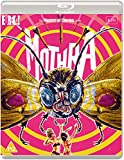 Mothra (Masters of Cinema) Blu-ray | Blu Ray | (15/11/2021)
from £14.29
| Saving you £N/A (N/A%)
| RRP
Mothra (Masters of Cinema) Blu-ray | Blu Ray | (15/11/2021)
from £14.29
| Saving you £N/A (N/A%)
| RRP One of the most iconic Japanese kaiju, Mothra has appeared in over a dozen feature films. Presented here is her debut, a gloriously vibrant piece of filmmaking that forever changed how kaiju eiga would be produced in Japan. Following reports of human life on Infant Island, the supposedly deserted site of atomic bomb tests, an international expedition to the heavily-radiated island discovers a native tribe and tiny twin female fairies called Shobijin who guard a sacred egg. The overzealous expedition leader kidnaps the Shobijin to exhibit in a Tokyo stage show but soon they summon their protector, hatching the egg and releasing a giant caterpillar. When Mothra arrives in Japan and transforms into her final form, the nation and its people face their destruction. Psychedelically colourful, with an intelligent, benevolent protector as its lead kaiju, Mothra was radically different to every other monster movie that had come before it, and it remains a classic of the genre to this day. The Masters of Cinema Series is proud to present IshirÅ Honda's Mothra on Blu-ray. Special Features Includes both Japanese and English versions Original audio presentations English subtitles (Japanese version) and English SDH (English version) Audio commentary with film historian and writer David Kalat Audio commentary with authors and Japanese sci-fi historians Steve Ryfle and Ed Godziszewski Kim Newman on Mothra' an interview with film critic and author Kim Newman on the history and legacy of Mothra Stills Galleries featuring rare archival stills and ephemera Trailers PLUS: A collector's booklet featuring an essay by Japanese cinema expert Jasper Sharp (Midnight Eye) and an extract from Steve Ryfle and Ed Godziszewski's IshirÅ Honda biography
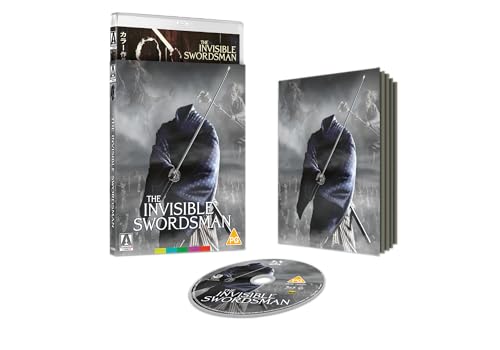 The Invisible Swordsman Limited Edition Blu-ray | Blu Ray | (23/06/2025)
from £22.98
| Saving you £N/A (N/A%)
| RRP
The Invisible Swordsman Limited Edition Blu-ray | Blu Ray | (23/06/2025)
from £22.98
| Saving you £N/A (N/A%)
| RRP Mysterious sprites, eerie supernatural goings on and heroic sword-fighting action abound in this mystical tale of vengeance and adventure from the makers of the Zatoichi, Daimajin and Yokai Monsters films. In Edo-era Japan, Sanshiro diligently hones his sword-fighting technique at the kendo dojo, but no amount of practice can hide the fact that he is both clumsy and cowardly. When his samurai father falls prey to a gang of murderous phantom thieves while on night watch duties, Sanshiro is drawn to the banks of the Sanzu River that separates the worlds of the living and the dead. Here he encounters a strange being that introduces itself as a Shokera. The otherworldly apparition offers advice on how Sanshiro can avenge his father with the aid of a mysterious potion with the power to turn him invisible. But first Sanshiro must gather the ingredients, and his father's killers might be closer to home than he thinks. Directed by Yoshiyuki Kuroda (Yokai Monsters: Spook Warfare, Lone Wolf and Cub: White Heaven in Hell) and beautifully shot by Hiroshi Imai (Zatoichi and the Doomed Man, The Haunted Palace), The Invisible Swordsman boasts the sumptuous attention to its historical setting, costume design, fight choreography and period details that Daiei Kyoto were renowned for, all with an added dose of rip-roaring fantasy and adventure. Arrow Films is proud to release this unseen gem in a brand new high-definition transfer for the very first time for the home video market outside of Japan. LIMITED EDITION CONTENTS ¢ High-Definition (1080p) Blu-ray presentation ¢ Original lossless Japanese mono audio ¢ Optional newly translated English subtitles ¢ Brand new audio commentary from author and Asian culture expert Jonathan Clements ¢ The Invisible People, a brand new interview with film critic Kim Newman on the history of invisibility in cinema ¢ Phantom Fighter, a brand new interview with film critic and Japanese cinema expert Jasper Sharp ¢ Image gallery ¢ Reversible sleeve featuring original and newly commissioned artwork by Jolyon Yates ¢ Illustrated collector's booklet featuring new writing on the film by Zack Davisson
![Godzilla [1954]](/pictures/1036979.jpg) Godzilla | DVD | (13/02/2006)
from £31.95
| Saving you £-11.96 (N/A%)
| RRP
Godzilla | DVD | (13/02/2006)
from £31.95
| Saving you £-11.96 (N/A%)
| RRP The legend begins... Released to coincide with the film's 50th anniversary - the original unexpurgated uncut and subtitles version of the film has rarely seen by British audiences. After American nuclear testing in the Pacific Ocean several ships are sunk in mysterious circumstances. The Japanese authorities close in on the neaby Odo island where natives relate tales of a devastating monster whom they call 'Gojira'. An expedition to the island by Professor Kyohei Yamane (Shi
![SHOGUN MB - MOVIE [DVD] [1980]](/pictures/1165739.jpg) SHOGUN MB - MOVIE | DVD | (07/03/2013)
from £12.50
| Saving you £N/A (N/A%)
| RRP
SHOGUN MB - MOVIE | DVD | (07/03/2013)
from £12.50
| Saving you £N/A (N/A%)
| RRP ![Shogun [5 Disc Box Set] [1981]](/pictures/1018256.jpg) Shogun | DVD | (05/04/2004)
from £46.99
| Saving you £-9.00 (N/A%)
| RRP
Shogun | DVD | (05/04/2004)
from £46.99
| Saving you £-9.00 (N/A%)
| RRP From the golden age of the miniseries comes Shogun, the 10-hour, Golden Globe-winning saga based on James Clavell's bestselling epic novel. In his award-winning performance, Richard Chamberlain stars as John Blackthorne, the 17th-century English navigator on a Dutch trading ship. A storm runs the ship aground off the coast of Japan, a "torn and cruelly divided country" locked in a power struggle between Toranaga (the venerable Toshiro Mifune) and Ishido, two warlords who would be Shogun. Blackthorne gets over his initial culture shock ("I piss on you and your country", he defiantly proclaims to his samurai captors, which to his humiliation turns out to be an unfortunate choice of words) to become a trusted ally of Toranaga and the lover of the beautiful interpreter Lady Mariko (Yoko Shimada). Their forbidden, ill-fated romance--and Blackthorne's total assimilation into Japanese culture--is set against political intrigue as Toranaga prepares for the inevitable showdown with Ishido, and Blackthorne's growing influence threatens the local Jesuits who had built up a lucrative trade monopoly. Shogun was a production blessed with good karma, and it remains an awesome achievement from a bygone era when the miniseries was king. --Donald Liebenson
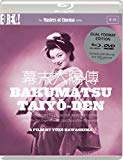 BAKUMATSU TAIYÔ-DEN (Masters of Cinema) Dual Format (Blu-ray & DVD) edition | Blu Ray | (12/06/2017)
from £N/A
| Saving you £N/A (N/A%)
| RRP
BAKUMATSU TAIYÔ-DEN (Masters of Cinema) Dual Format (Blu-ray & DVD) edition | Blu Ray | (12/06/2017)
from £N/A
| Saving you £N/A (N/A%)
| RRP Voted one of the top five Japanese films ever made in a critic's poll by Japan's leading cinema publication Kinema Junpô, yet barely known in the West, Y ûzô Kawashima's richly funny multi - levelled portrait of Japanese society Bakumatsu taiyô - den [ A Sun - Tribe Myth from the Bakumatsu Era] is a glorious rediscovery. When man- about- town Saheiji (the beloved comedian Frankie Sakai) finds himself unable to pay for a bill at a brothel, he is forced to remain there to work off his debt. However he finds his wit and resourcefulness enable him to turn this situation to his advantage, as he interacts with a whole range of characters, from rivalling courtesans to political activists. Co- scripted by Shôhei Imamura ( Vengeance Is Mine), it sharply and comically demonstrates the constants of human nature just as it delineates the tumultuous political times (the 1860s, leading up to the Meiji Restoration) in which they lived. DUAL FORMAT SPECIAL EDITION FEATURES: Gorgeous Nikkatsu restoration of the film in its original aspect ratio, presented in 1080p HD on the Blu-ray I English subtitles 36-PAGE BOOKLET including a new and exclusive essay by critic/scholar Frederick Veith; Shôhei Imamura's tribute to Yûzô Kawashima; and rare and archival imagery.
![Monkey! - Episodes 1-3 [1979]](/pictures/1003363.jpg) Monkey! - Episodes 1-3 | DVD | (23/09/2002)
from £8.35
| Saving you £11.64 (139.40%)
| RRP
Monkey! - Episodes 1-3 | DVD | (23/09/2002)
from £8.35
| Saving you £11.64 (139.40%)
| RRP A loose (very loose) Japanese TV adaptation of Wu Ch'eng-en's 16th-century collection of Chinese fables, Monkey! was re-dubbed into English in the early 1980s and became required viewing for a whole generation of school children. The titular monkey (played with great enthusiasm, not to mention athleticism by Japanese comic actor and former rock star Masaaki Sakai) accompanies boy-monk Tripitaka (confusingly, a pretty actress called Masako Natsume) on his/her quest for the Indian Sutras. They pick up Sandy (Shiro Kishibe), Pigsy (Toshiyuki Nishida) and a dragon that becomes a horse along the way. The appeal of Monkey! is easier to experience than explain. It's an occasionally surreal blend of Oriental fable, knock-about martial arts, pop Buddhism and slapstick comedy. The frequent comic fight scenes are accompanied by a 70s disco-fusion soundtrack, and a narrator (English voice: Frank Duncan) uses gaps in the action to deliver inscrutable snippets of wisdom ("Even a starving camel is still bigger than a horse", "Does love mean labour even for the carp-hearted?"). Best of all, though, is the dialogue: without regard to any lip-synch niceties the English script (by David Weir) is full of idiomatic delights, jokes and double entendres. All are delivered by British actors in hilarious cod-Japanese accents (distinguished thesp Miriam Margolyes is the voice of Tripitaka). Bad special effects crown the show's cheesy, retro appeal. On the DVD: Monkey! volume 1 on DVD features the same first three episodes as the VHS incarnation--"Monkey Goes Wild About Heaven", "Monkey Turns Nursemaid" and "The Great Journey Begins"--but also a bonus previously unseen episode from the second season, "You Win Some You Lose Some", which is subtitled not dubbed, so if nothing else is an opportunity to hear the actors' real voices. Extra features are a stills gallery, text pieces on the principal cast, characters and episodes, Weblinks, trailers for The Water Margin and Blake's Seven and a pop-video version of the show's irrepressible main title song.----Mark Walker
![Monkey! - Thirteen Re-Dubbed Episodes [1979]](/pictures/1001154.jpg) Monkey! - Thirteen Re-Dubbed Episodes | DVD | (27/09/2004)
from £N/A
| Saving you £N/A (N/A%)
| RRP
Monkey! - Thirteen Re-Dubbed Episodes | DVD | (27/09/2004)
from £N/A
| Saving you £N/A (N/A%)
| RRP Amazingly after 25 years the original dubbing cast for Monkey regrouped to finish off the 13 un-dubbed missing original episodes. With the show celebrating it's 25th anniversary since its' first BBC TV broadcast and 2004 being The Chinese New Year of The Monkey' Fabulous Films has completed this massive task. Now for the first time everyone can enjoy the prosperity and fortune with these DVDs in this The Year of the Monkey. ""Born from an egg on a mountain top The punkiest Monkey
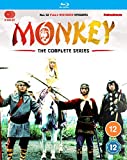 Monkey: The Complete Series (Restored) Blu-Ray | Blu Ray | (05/10/2020)
from £75.09
| Saving you £N/A (N/A%)
| RRP
Monkey: The Complete Series (Restored) Blu-Ray | Blu Ray | (05/10/2020)
from £75.09
| Saving you £N/A (N/A%)
| RRP THE WORLDWIDE BLU-RAY PREMIERE! In the worlds before Monkey, primal chaos reigned. Heaven sought order. But the phoenix can only when its feathers are grown. The four worlds formed again and yet again, As endless aeons wheeled and passed.Time and the pure essences of Heaven, the moisture of the Earth, the powers of the sun and the moon . All worked upon a certain rock, old as creation. And it became magically fertile. That first egg was named Thought . Tathagata Buddha, the Father Buddha, said, With our thoughts, we make the world. Elemental forces caused the egg to hatch.From it then came a stone monkey. The nature of Monkey was irrepressible!
![Monkey! - Episodes 1 To 13 [1978]](/pictures/1001702.jpg) Monkey! - Episodes 1 To 13 | DVD | (29/03/2004)
from £22.89
| Saving you £17.10 (74.71%)
| RRP
Monkey! - Episodes 1 To 13 | DVD | (29/03/2004)
from £22.89
| Saving you £17.10 (74.71%)
| RRP Monkey! is a loose (very loose) Japanese TV adaptation of Wu Ch'eng-en's 16th-century collection of Chinese fables, which was re-dubbed into English in the early 1980s and became required viewing for a whole generation of schoolchildren. The titular monkey (played with great enthusiasm, not to mention athleticism by Japanese comic actor and former rock star Masaaki Sakai) accompanies boy-monk Tripitaka (confusingly, a pretty actress called Masako Natsume) on his/her quest for the Indian Sutras. They pick up Sandy (Shiro Kishibe), Pigsy (Toshiyuki Nishida) and a dragon that becomes a horse along the way. The appeal of Monkey! is easier to experience than explain. It's an occasionally surreal blend of Oriental fable, knock-about martial arts, pop Buddhism and slapstick comedy. The frequent comic fight scenes are accompanied by a 70s disco-fusion soundtrack, and a narrator (English voice: Frank Duncan) uses gaps in the action to deliver inscrutable snippets of wisdom ("Even a starving camel is still bigger than a horse", "Does love mean labour even for the carp-hearted?"). Best of all, though, is the dialogue: without regard to any lip-synch niceties, the English script (by David Weir) is full of idiomatic delights, jokes and double entendres ("I can use it as well", boasts Monkey of his staff that grows from a tiny stick into a big pole. "Ooh, I never doubted it, passionate primate", purrs the Dragon Princess into his ear, "go on, make it bigger"). All are delivered by British actors in hilariously cod-Japanese accents (distinguished thesp Miriam Margolyes is the voice of Tripitaka). Bad special effects crown the show's cheesy, retro appeal. ----Mark Walker
![When The Last Sword Is Drawn [2003]](/pictures/1017067.jpg) When The Last Sword Is Drawn | DVD | (25/04/2005)
from £28.75
| Saving you £-13.76 (N/A%)
| RRP
When The Last Sword Is Drawn | DVD | (25/04/2005)
from £28.75
| Saving you £-13.76 (N/A%)
| RRP Kanichiro Yoshimura is a samurai family man who can no longer feed his wife and children due to the low wages paid from his small town clan
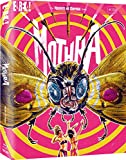 Mothra (Masters of Cinema) LIMITED EDITION Blu-ray | Blu Ray | (16/11/2020)
from £N/A
| Saving you £N/A (N/A%)
| RRP
Mothra (Masters of Cinema) LIMITED EDITION Blu-ray | Blu Ray | (16/11/2020)
from £N/A
| Saving you £N/A (N/A%)
| RRP One of the most iconic Japanese kaiju (films featuring giant monsters), Mothra has appeared in over a dozen feature films. Presented here is her debut, a gloriously vibrant piece of filmmaking that forever changed how kaiju eiga would be produced in Japan. Following reports of human life on Infant Island, the supposedly deserted site of atomic bomb tests, an international expedition to the heavily-radiated island discovers a native tribe and tiny twin female fairies called Shobijin who guard a sacred egg. The overzealous expedition leader kidnaps the Shobijin to exhibit in a Tokyo stage show but soon they summon their protector, hatching the egg and releasing a giant caterpillar. When Mothra arrives in Japan and transforms into her final form, the nation and its people face their destruction. Psychedelically colourful, with an intelligent, benevolent protector as its lead kaiju, Mothra was radically different to every other monster movie that had come before it, and it remains a classic of the genre to this day. The Masters of Cinema Series is proud to present IshirÅ Honda's Mothra on Blu-ray for the first time on home video in the UK. Extras: Hardbound Slipcase Reversible poster featuring the film's original US and Japanese poster artwork Includes both Japanese and English versions of each film (101 mins & 90 mins respectively) Original mono audio presentations (LPCM) English subtitles (Japanese version) and English SDH (English version) Brand new audio commentary with film historian and writer David Kalat Audio commentary with authors and Japanese sci-fi historians Steve Ryfle and Ed Godziszewski Kim Newman on Mothra' an interview with film critic and author Kim Newman on the history and legacy of Mothra Mothra: 1974 Champion Festival Version [61 mins] a special version of the film edited by IshirÅ Honda for the 1974 Toho Champion Festival (INCLUSION TBC) Stills Galleries featuring rare archival stills and ephemera PLUS: A Perfect Bound 60-PAGE Collector's Booklet featuring essays by Christopher Stewardson and Japanese cinema expert Jasper Sharp (Midnight Eye); a new interview with Scott Chambliss (production designer on 2019's Godzilla: King of the Monsters); an extract from Steve Ryfle and Ed Godziszewski's IshirÅ Honda biography; and archival reviews and stills.
![Ju-on: The Grudge Collection [Limited Edition] [Blu-ray]](/pictures/1160919.jpg) Ju-on: The Grudge Collection | Blu Ray | (12/12/2022)
from £115.26
| Saving you £N/A (N/A%)
| RRP
Ju-on: The Grudge Collection | Blu Ray | (12/12/2022)
from £115.26
| Saving you £N/A (N/A%)
| RRP Ju-On: the name given to a deadly curse spawned when someone dies in the grip of a violent rage. All who come into contact with it are doomed... Collected together for the first time, writer-director Takashi Shimizu's Ju-On: The Grudge series represents the flesh-crawling pinnacle of Japanese chillers that swept the globe at the turn of the millennium. The films introduce the anonymous family house in the suburbs of Tokyo where an unspeakable evil lingers alongside its residents, the ghastly mother-son pairing of Kayoko and Toshio Saeki. Shimizu's disconcerting approach to plotting, unnerving eye for the uncanny details in the dark corners of the frame and an innate talent for effective jump scares so impressed Evil Dead director Sam Raimi that he invited the director to helm two Hollywood remakes. The quintessential J-horror series make its Blu-ray debut with a brand new 4K restoration of Ju-On: The Grudge and a wealth of new and archival extras, including Shimizu's two The Curse straight-to-video precursors (previously unreleased outside Japan) and the White Ghost/Black Ghost diptych of tales unfolding within the same terrifying universe. Product Features Brand new 4K restoration of Ju-On: The Grudge from the original camera negative by Arrow Films 4K (2160p) Ultra HD Blu-ray presentation of Ju-On: The Grudge in Dolby Vision (HDR10 compatible) High Definition Blu-ray (1080p) presentations of all films Home video premiere outside Japan of Ju-On: The Curse and Ju-On: The Curse 2 Original 5.1 DTS-HD Master Audio (except The Curse and The Curse 2) and 2.0 stereo audio Optional English subtitles Exclusive 60-page collector's booklet featuring writing by Grady Hendrix, James Marsh, Tom Mes, William Carroll and Lindsay Nelson [Limited Edition Exclusive] Reversible sleeves featuring original and newly commissioned artwork by Oink Creative Twenty-four double-sided, postcard-sized artcards [Limited Edition Exclusive] Reversible poster with new and original artwork [Limited Edition Exclusive] DISC 1 JU-ON: THE CURSE AND JU-ON: THE CURSE 2 (BLU-RAY) Introduction to both films by writer-director Takashi Shimizu Introduction to Ju-On: The Curse by actor Takako Fuji DISC 2 & 3 JU-ON: THE GRUDGE (4K ULTRA HD BLU-RAY / BLU-RAY) Brand new 4K restoration from the original camera negative by Arrow Films Introduction by writer-director Takashi Shimizu New audio commentary by film historian David Kalat Audio commentary by Sam Raimi and Scott Spiegel Alternate English dub track in 5.1 Surround Haunting in Monochrome, a new interview with Takashi Shimizu on the Ju-On films Being Kayako, a new interview with Takako Fuji on her role as Kayako The Evolution of Ju-On, a brand new featurette with authors and Japan specialists Tom Mes and Zack Davisson discussing the cultural forces that shaped the series Through a Glass Darkly, an archive interview with Takashi Shimizu Whispers in the Dark, an archive interview with actor Megumi Okina on her role as Rika Fade to Black, an archive interview with actress Kayoko Shibata, who plays Mariko On-set interviews with Takashi Shimizu, Megumi Okina, Misaki Ito, Misa Uehara and Yui Ichikawa Deleted scenes with commentary by Takashi Shimizu Almost an hour of behind-the-scenes footage Ju-On True Stories, two ghostly true-life tales that inspired the films, narrated by Hiroyoshi Kihara Original trailers Image gallery DISC 4 JU-ON: THE GRUDGE 2 (BLU-RAY) Introduction by writer-director Takashi Shimizu New audio commentary with scholar Raechel Dumas and critic Jasper Sharp Alternate English dub track in 5.1 Surround Interview with Takashi Shimizu from the time of making Ju-On: The Grudge 2 On-set interviews with Noriko Sakai, Chiharu Niiyama, Kei Horie, Yui Ichikawa, Emi Yamamoto and Shingo Katsurayama Deleted scenes 55 minutes of behind-the-scenes footage On-set reports by cast members Noriko Sakai, Yui Ichikawa and Erika Kuroishi Premieres and stage greetings footage from Japan, Taiwan and Korea Trailers and TV spots Image gallery DISC 5 JU-ON: WHITE GHOST AND JU-ON: BLACK GHOST (BLU-RAY) Introduction to Ju-On: Black Ghost by writer-director Mari Asato New interview with Mari Asato Original trailer Image galleries
![Monkey! - Episodes 19-21 [1980]](/pictures/1003101.jpg) Monkey! - Episodes 19-21 | DVD | (23/09/2002)
from £5.99
| Saving you £14.00 (233.72%)
| RRP
Monkey! - Episodes 19-21 | DVD | (23/09/2002)
from £5.99
| Saving you £14.00 (233.72%)
| RRP Contains the episodes... Vampire Master The Prime Minister of the Kingdom of Buddha's Law invites Tripitaka and his disciples to stay as his honoured guests. He tells them of the difficulty in controlling the black magicians shape-changers and bandits who live in the nearby mountains. Tragedy strikes when Tripitaka becomes critically ill with Tibetan Fever. Meanwhile Pigsy leads the guards in a search for the vampire responsible for a girl's murder. He makes a shocking dis
![Monkey! - Episodes 22-24 [1980]](/pictures/1002873.jpg) Monkey! - Episodes 22-24 | DVD | (20/01/2003)
from £6.95
| Saving you £13.04 (187.63%)
| RRP
Monkey! - Episodes 22-24 | DVD | (20/01/2003)
from £6.95
| Saving you £13.04 (187.63%)
| RRP Village Of The Undead In a deserted village the evil male demon Wun-Lung and three beautiful witches await the arrival of Tripitaka Monkey Pigsy and Sandy. If they can make the four travellers believe in them they'll be brought to life. They plan to capture Tripitaka and his disciples one by one and convince them of their existence by killing them. Who'll be the first pilgrim to fall into the trap? Two Little Blessings Forty years before the pilgrims' journey to
![Monkey! - Episodes 34-36 [1980]](/pictures/1002541.jpg) Monkey! - Episodes 34-36 | DVD | (26/05/2003)
from £6.95
| Saving you £13.04 (187.63%)
| RRP
Monkey! - Episodes 34-36 | DVD | (26/05/2003)
from £6.95
| Saving you £13.04 (187.63%)
| RRP Keep On Dancing: A young goblin Yung-Hu is desperately in love with a married human woman called I-Ling. I-Ling and her husband Kwo-Fong are excited that the pilgrims are approaching because they want to learn about Buddha. Tripitaka is deeply offended by I-Ling's awful Buddhist dance and the pilgrims leave. The goblin father disguises himself as a priest and convinces Kwo-Fong to join Tripitaka's pilgrimage to India to become a Buddhist. With Kwo-Fong out of the way Yu

Please wait. Loading...
This site uses cookies.
More details in our privacy policy